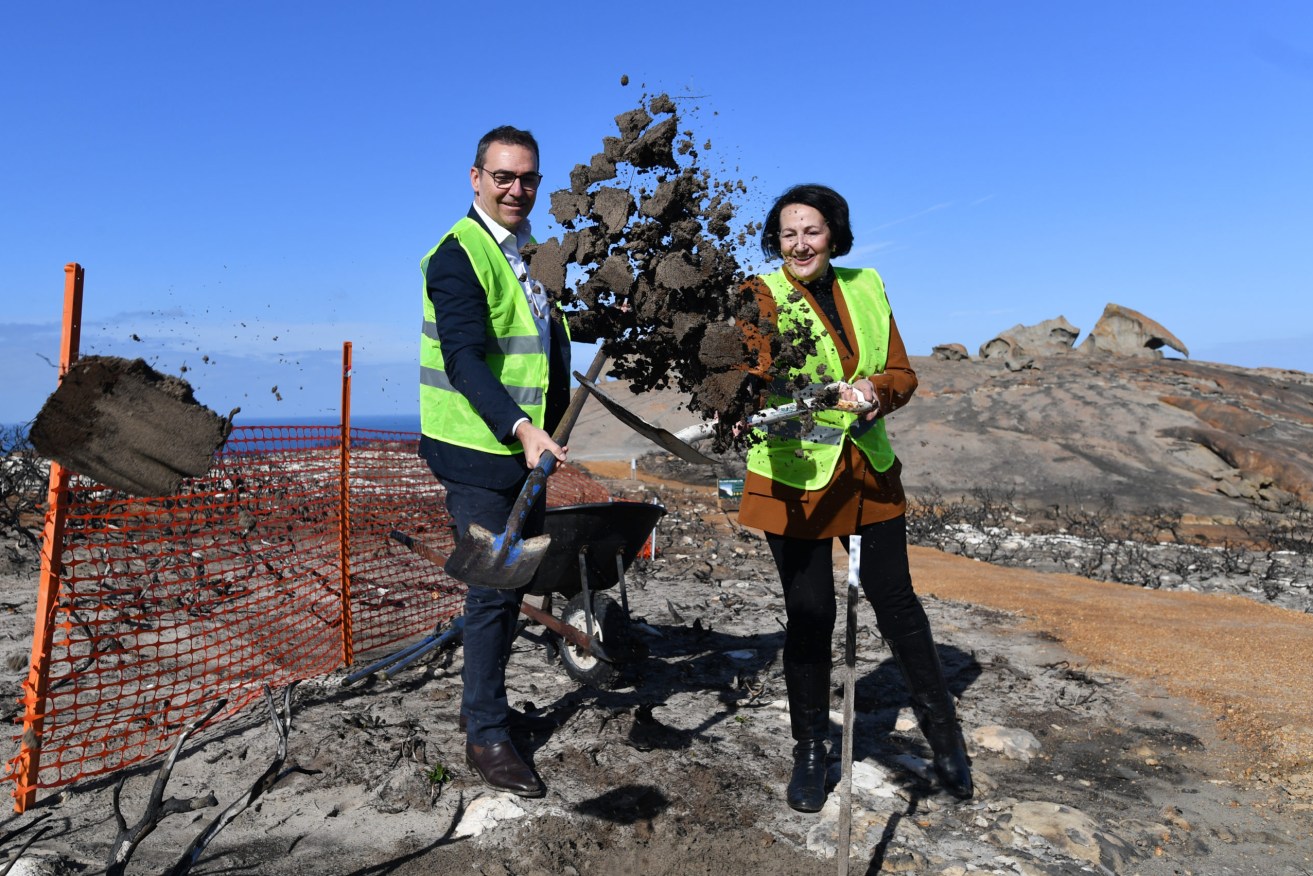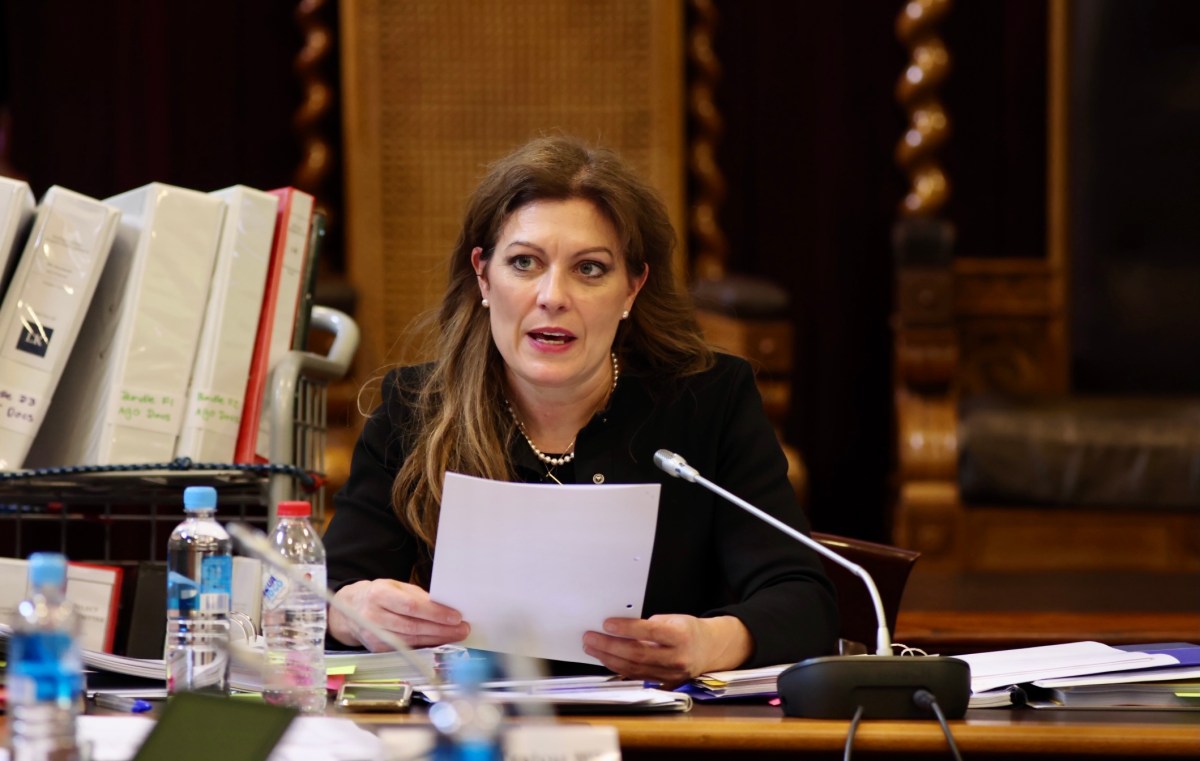Conflicts, potential misconduct: QC calls for Ombudsman to investigate Chapman, Marshall
UPDATED | Attorney-General Vickie Chapman was in a position of “not just perceived but actual conflict” when she vetoed a $40 million Kangaroo Island port, a QC advising a parliamentary inquiry has found in a damning assessment that recommends referring the Deputy Premier – along with Premier Steven Marshall and senior bureaucrats – to the State Ombudsman for investigation.

Premier Steven Marshall and Deputy Premier Vickie Chapman on Kangaroo Island last year. Photo: David Mariuz / AAP
The damning conclusions of Dr Rachael Gray QC, the counsel assisting the parliamentary committee, were handed down this afternoon, with recommendations that – if adopted – could have serious consequences for both the Deputy Premier and the Marshall Government.
In a statement late today, the Attorney-General said: “I reiterate I had no conflict of interest, actual or perceived, in this matter, nor did I mislead the Parliament.”
However, Gray found that Chapman may have misled parliament on several occasions, and deemed the port approval process “a significant failure of good governance” and departure from accepted practice.
The parliamentary committee – comprised of two Labor MPs, two Liberals and one ex-Liberal independent, Sam Duluk – is examining whether Chapman, as planning minister, had a real or perceived conflict linked to her family ties and property holdings on Kangaroo Island, and further whether she misled parliament or breached the ministerial code of conduct.
Gray found that “on the evidence before the committee… the Attorney-General was in a position of not just perceived conflict, but actual conflict”, advising that it was “open for the committee” to make this finding.
This, she said, was “by reason of her longstanding friendship with Michael Pengilly”, the KI mayor and former Liberal MP for Finniss, who is a longstanding and vehement opponent of the proposed Smith Bay port, as well as the impact of the proposed development on land adjacent property owned by Chapman.
It was further open to the inquiry to find, Gray argued, that if the proposed port had an impact on Chapman’s property interests – and their potential to generate income via an AirBnB – “it follows that the Attorney was in a position of actual conflict and ought not to have made the decision”.
“It’s recommended the committee refer the matter of a conflict to the House,” she said.
She said Chapman was aware before she made the decision to knock back the major development of questions regarding “whether or not the she was in a position of conflict”, after claims to that effect were made in media reports and in parliament.
Further, the state’s Independent Commissioner Against Corruption “published a detailed handbook addressing conflicts of interest in public administration”.
“But no-one appears to have advised the A-G that she ought not to make the decision,” Gray told parliament.
She said Chapman’s evidence was that “she did not have a conflict nor had any doubt” that she did not have a conflict.
However, she went on, “on any reasonable view of the situation, the questions being raised should have given rise to some doubt in the A-G’s mind as to whether she had a conflict”.
“She should have reported the matter to the Premier, or at the very least sought advice,” she said.
Gray noted too that under the code it is the Premier’s “responsibility to deal with conflict” as a guiding principle of responsible government.
She said it would be open to any member of the committee to refer any matter involving a potential breach of the code of conduct to parliament “to determine whether it was of sufficient magnitude to amount to contempt”.
Gray said it was arguable that the A-G’s conduct had a potential to prompt a financial damages claim from the port’s proponent, Kangaroo island Plantation Timbers, adding the matter was “not trivial nor political point-scoring” but a “significant departure from governance practices”.

Dr Rachael Gray QC made her final arguments today. Photo: Tony Lewis / InDaily
While, she said, the “ultimate responsibility” for declaring a conflict “lies with the individual involved”, Gray noted that the Premier also “has a responsibility for ensuring that ministers uphold standards”.
She said this was such a significant departure from those standards to warrant a referral to Ombudsman Wayne Lines, and “recommended a referral is made by this committee to the Ombudsman”.
Gray said the committee was open to refer various comments made by the Attorney in parliament to the House to consider whether they constituted a contempt, as “conduct which obstructs or impedes the House”.
“Actual conflict may be a contempt… deliberately misleading the House may be regarded as a contempt,” she said.
Gray recommended that three statements by Chapman should be referred to parliament, including claims that she had no pecuniary interest or property holdings “near or impacted by” the proposed development.
“The clear weight of the evidence is this statement was false… it is open to the committee to find the A-G knew this statement was false,” Gray said.
She said the evidence heard by the inquiry suggested a claim by Chapman that no proposed haulage routes went past Pengilly’s house was similarly false, and “recommended this finding is made”.
“It is open for the committee to find the A-G knew this statement was false – and the weight of evidence supports this finding,” she said.
Gray said it was open to the committee to refer several misleading statements to parliament “to determine whether the A-G should be prosecuted before the House for misleading” parliament – and strongly recommended it did so in relation to two statements in particular.
She questioned whether Chapman had been “able to bring an impartial mind to the performance of her ministerial duties”, noting the inquiry had “revealed a significant departure from proper governance practices”.
“It’s recommended the matter be referred to the Ombudsman by the committee – including whether or not maladministration and misconduct arose, whether the Attorney-General had a conflict of interest, any breach of the ministerial code of conduct and the role that any other public officer undertook – including the Premier, departmental chief executives [and] crown law officers,” she said.
She said “ministers of the crown in the Westminster system of government hold a great deal of power” which can “markedly affect” individuals, businesses, communities “and all South Australians”.
“Ministers must accept standards of conduct of the highest order,” she said.
Gray found the episode highlighted the “undesirability of having a single decision-maker in respect of major developments”, suggesting such decisions should instead be “made by cabinet or the state planning assessment panel”.
“The question of whether it’s preferable or desirable is clearly a matter for the legislature,” she said, but recommended the question be referred to a standing committee for consideration, saying the “evidence has revealed a significant failure of good governance”.
It was “important”, Gray said, that “the House consider carefully the conduct of the Attorney-General” as well as the “manner in which such a departure of good governance was able to occur”.
“Where were the checks and balances on what was happening?” she said, noting that despite objections raised about prospective conflicts of interest “the process just went on”.
Chapman and Marshall have been contacted for comment.
Marshall’s office said he had nothing to add to comments he made this morning, in which he declared it “ultimately my decision” whether his deputy had breached the code of conduct.
“If you’re referring to the very expensive kangaroo court which has occurred in parliament house in recent days, I don’t think there’s a single piece of evidence that would move my decision to 100 per cent support the deputy premier,” he said.
“The requirement under the ministerial code of conduct is [that] I form that opinion, and I’ve looked at all the evidence that was presented last week [and] certainly to me there’s been no conflict of interest whatsoever.”
He went further, insisting Chapman “made the right decision” not to allow the project to proceed, despite advice from her department and the independent Planning Commission that it could go ahead “on balance [and] subject to additional requirements (including reserved matters for further assessment) and conditions”.
“I back [her decision] 100 per cent… I would have made the same decision if it was my requirement to make the decision,” Marshall said.
“I’m just saying, I don’t perceive that there’s a conflict of interest whatsoever.”
The committee members are not bound by Gray’s recommendations, but the emphatic nature of them will make it politically difficult to make findings significantly at odds with those of the counsel assisting.
In a statement late today, Chapman – who last week began legal proceedings against a Labor member of the committee, Tom Koutsantonis, over comments he has tweeted throughout – revealed she would be submitting a written response to Gray’s findings.
“I am yet to review the transcript of Dr Gray’s closing statement, however, I note that no findings have been made by the Committee, no report has been presented to the Parliament [and] in any event, I have yet to provide written submissions of my own to close, or respond to Dr Gray’s statement,” she said.




